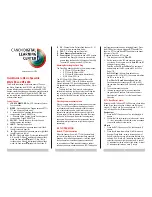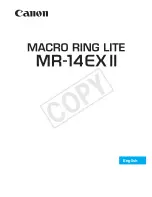
10
•
Use of power sources not expressly recommended for this
equipment may lead to overheating, distortion of the
equipment, fire, electrical shock or other hazards.
Use only
the recommended power accessories.
•
Do not place the batteries near a heat source or expose
them to direct flame or heat.
Neither should you immerse
them in water. Such exposure may damage the batteries and
lead to the leakage of corrosive liquids, fire, electrical shock,
explosion or serious injury.
•
Do not attempt to disassemble, alter or apply heat to the
batteries.
There is serious risk of injury due to an explosion.
Immediately flush with water any area of the body, including the
eyes and mouth, or clothing, that comes into contact with the
inner contents of a battery. If the eyes or mouth contact these
substances, immediately flush with water and seek medical
assistance.
•
Avoid dropping or subjecting the batteries to severe impacts
that could damage the casings.
It could lead to leakage and
injury.
•
Do not short-circuit the battery terminals with metallic
objects, such as key holders.
It could lead to overheating,
burns and other injuries.
•
Before you discard a battery, cover the terminals with tape
or other insulators to prevent direct contact with other
objects.
Contact with the metallic components of other
materials in waste containers may lead to fire or explosions.
Discard the batteries in specialized waste facilities if available
in your area.
•
Use of batteries not expressly recommended for this
equipment may cause explosions or leaks, resulting in fire,
injury and damage to the surroundings.
Use only
recommended batteries and accessories.
•
If using AA-size NiMH batteries, use only Canon AA-size
NiMH batteries and charger recommended for use with
these batteries.
Use of another charger may cause batteries
to overheat or deform, posing risk of fire or electric shock.















































